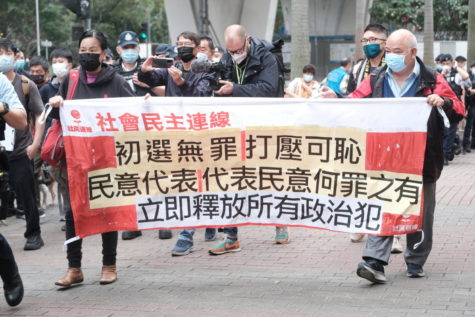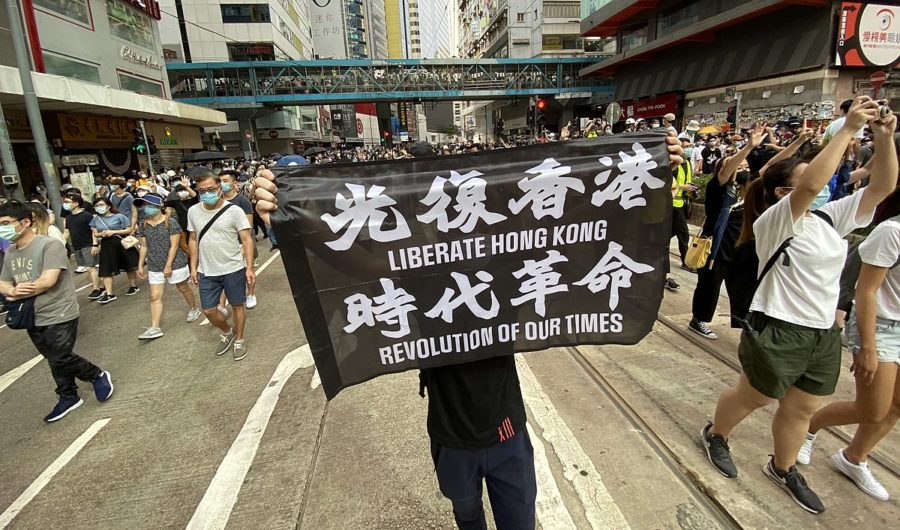Hong Kong’s Largest National Security Trial Begins
47 pro democracy activists in Hong Kong are under prosecution by the National Security Department for “conspiracy to commit subversion.” This event has sparked a new wave of protests in Hong Kong.
Voice of America, Cantonese Service, Iris Tong, Public domain, via Wikimedia Commons
The phrase “Liberate Hong Kong, revolution of our times” was first used in 2016 by Hong Kong politician Edward Leung as a campaign slogan. The phrase gained popularity again during protests in 2020 over the national security law.
During the First Opium War, Britain took control of the island of Hong Kong in order to expand their trade with China. In 1898, Britain was given a 99 year lease of Hong Kong by the Second Convention of Peking. After the 99 years came to an end in 1997, the island was handed back to China and was promised 50 years with “a high degree of autonomy,” such as an independent judiciary and freedom of assembly and speech. These rights are outlined in Hong Kong’s constitution, called the Basic Law.
However, concerns over the loss of Hong Kong’s autonomy grew amongst Hong Kong citizens starting in 2019, due to the proposal of an extradition bill, which would have allowed criminal suspects to be extradited to mainland China. This bill sparked numerous protests in Hong Kong during the following months. Subsequently, Beijing passed the National Security Law in June of 2020. The law contains over 60 articles, notably outlawing crimes related to secession, subversion, terrorist activities, and collusion with foreign countries.
Under this law, even peaceful political expression is classified as an endangerment to national security. Many people find this law to be overly restrictive and a threat to protected human rights.
Tong Ying-kit was sentenced to nine years in prison under the charges of inciting secession and terrorism after driving a motorcycle carrying a flag that read “Liberate Hong Kong, revolution of our times.” Additionally, over 100 people were arrested during white paper protests against China’s severe COVID 19 restrictions, which were sparked by the death of 10 people in an apartment building in Ürümqi, where a fire started and lockdown measures prevented firefighters from reaching the victims in time.
“My grandparents in China always have to be aware of what they say, especially if it’s online. Anything negative about the Chinese government will be censored, and if it’s more extreme they will even arrest you,” said Nina Xie ’24.
The Hong Kong government operates under a one country, two systems policy. This means that Hong Kong is able to maintain its own social and economic systems despite being considered a part of China, which allows its citizens democratic freedoms that citizens in mainland China do not have. However, the establishment of the national security law has drastically changed Hong Kong society and pushed it towards an authoritarian system. The law has caused a variety of organizations within the city to disband.
Members of the Hong Kong Confederation of Trade Unions (HKCTU), Hong Kong’s largest pro-democracy trade union, voted to disband in October of 2021. The Civil Human Rights Front (CHRF), an organization that focuses on the development of the human rights movement in Hong Kong, disbanded in August of 2021 after Figo Chan, its convener, was imprisoned for his participation in anti-government protests in 2019.
“CHRF originally hoped to continue to face the challenge with everyone in the existing ways, but convener Figo Chan is already in jail because of several cases, and the secretariat can no longer maintain its operations. With no members participating in the next secretariat, we can only begrudgingly announce our disbandment,” CHRF said in a statement.
Despite China’s crackdown on anti-government protests in Hong Kong, hundreds of thousands of people attended an unofficial primary election held in July of 2020. Led by Benny Tai, a law professor at the University of Hong Kong, as well as numerous other activists, the election was meant to select pro-democracy candidates for the following Legislative Council election. This council is responsible for making and amending Hong Kong’s laws. Unable to express themselves in protests, voters initially perceived this election as a safe way to continue fighting for what they believe in.
However, this primary election was soon denounced by Beijing’s representative office in Hong Kong, who claimed that Tai’s actions are damaging the integrity of legislative elections.
Sure enough, in February 2021, 47 leaders of the election were charged with trying to subvert state power, and promptly arrested.
The prosecutors argue that the 47 activists were rightfully arrested because their actions were vicious and an attempt at mutual destruction. Defendants, on the other hand, argue that it was simply normal political opposition. Ex-Hong Kong lawmaker Leung Kwok-hung, who pleaded not guilty, said, “it is not a crime to act against a totalitarian regime.”
Of the 47 defendants, 31 are pleading guilty and the remaining 16 are pleading not guilty. Most of the defendants are expected to receive prison sentences, which could range from less than three years to life.
Among the defendants pleading guilty are Benny Tai and Joshua Wong. Wong has been a prominent figure in Hong Kong protests since the Umbrella Movement in 2014, when he led student participants in a sit-in at the Central Government Complex in Admiralty for universal suffrage, called the Occupy Central movement. This movement is also known as the Umbrella Movement due to the protestors’ use of umbrellas as protection against the police’s pepper spray and tear gas. Also in 2021, Wong was sentenced to 10 months in jail for his participation in an annual vigil commemorating the victims of the 1989 Tiananmen Square Massacre.
In fact, most of the defendants are activists who have dedicated the majority of their lives to fighting for democracy. For instance, former Legislative Council member Claudia Mo also participated in the 2014 Umbrella Movement and protested against Beijing’s influence over Hong Kong. Another is activist and journalist Gwyneth Ho is well known for her reporting of the 2019-2020 Hong Kong Protests.
Earlier this year, United States President Joseph Biden extended the Deferred Enforced Departure (DED), a program which protects Hong Kong citizens in the United States from deportation for two years. This decision would offer people from Hong Kong protection from the repression brought on by the National Security Law by allowing them to live and work in the United States.
U.S. Secretary of State Antony Blinken responded to the arrests of the pro-democracy activists by stating that they are “an assault on those bravely advocating for universal rights.”
Similarly, responses from other foreign nations also disapprove of the arrests. British Foreign Secretary Dominic Raab called the arrests “a grievous attack on Hong Kong’s rights and freedoms as protected under the Joint Declaration.” After all, the Sino-British Joint Declaration is what provided the blueprint for Hong Kong’s Basic Law and assured a high degree of autonomy for the Hong Kong government when it was transferred back to Chinese control. In particular, it ensured a self-governing special administrative region in the city.
Opposition towards the National Security Law is apparent within Hong Kong as well, with protests emerging over the arrest of the 47 activists. At the West Kowloon Magistrates’ Court in Hong Kong, hundreds of protestors chanted slogans such as “liberate Hong Kong, revolution of our times,” and “fight for freedom, stand with Hong Kong,” as they gathered to support the defendants.

“I find it extremely ironic because China’s government wants censorship in order to maintain order and to keep the government’s authority. But by doing that, it creates the exact opposite,” said Xie.
Some organizations within Hong Kong have maintained their support of the arrests.
The Liaison Office of the Central People’s Government, which represents the Chinese Central People’s Government in Hong Kong, stated, “the general public can clearly see the evil intentions of Benny Tai Yiu-ting and others, and the harm caused to Hong Kong society.” Secretary for Security John Lee states that the primary elections were an attempt from Hong Kong’s pro democracy groups to gain a majority in the Legislative Council in order to “paralyze” the government.
The trial of the Hong Kong 47 began on February 6th, 2023, and is expected to last 90 days. Not only will the outcome of this trial have major effects on the future of pro-democracy movements in Hong Kong, but it will also determine the extent to which Beijing will continue to influence Hong Kong society, including the basic freedoms and rights of Hong Kong citizens.
“I find it extremely ironic because China’s government wants censorship to maintain order and to keep the government’s authority. But by doing that, it creates the exact opposite,” said Xie.
Grace Mao is a Managing Editor for 'The Science Survey,' where she edits her peers’ articles across various sections before they are published online....

